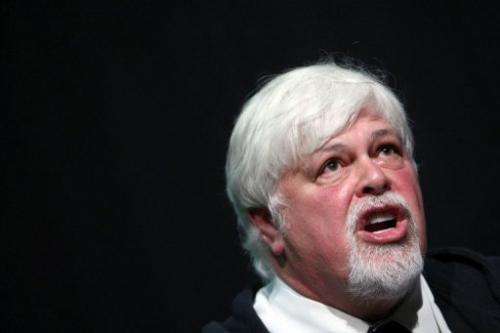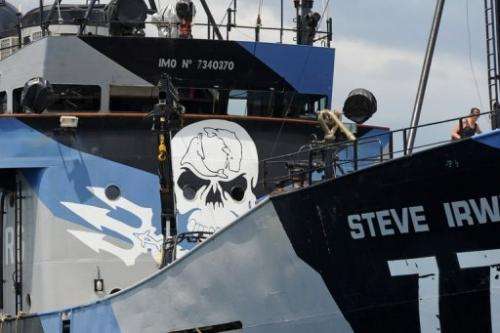Fugitive Sea Shepherd founder hands over reins

The fugitive founder of Sea Shepherd has stepped down from key roles at the militant anti-whaling group, passing the Antarctic harpoon chase mantle to a former Australian politician.
Canadian Paul Watson is wanted by Interpol after skipping bail last July in Germany, where he was arrested on Costa Rican charges relating to a high-seas confrontation over shark finning in 2002.
Due to a raft of legal issues he has stepped down as president of the group in the US and Australia, and as captain of flagship anti-hunt vessel the "Steve Irwin", although he will remain with the fleet during this year's campaign.
Watson's whereabouts had been a mystery until December, when he confirmed that he was back on board a Sea Shepherd vessel and ready for the group's annual Southern Ocean expedition against the Japanese whaling fleet.
Sea Shepherd said he would take a back seat in the chase, with Bob Brown—founder and long-time chief of Australia's environmentally minded Greens party—to direct operations.
The Steve Irwin will be captained by Indian sailor Siddharth Chakravarty, formerly the ship's first officer, with Watson to "remain aboard to document the campaign".

"I am honoured to serve the great whales of the Southern Ocean and Sea Shepherd in this way," said Brown, a renowned conservationist.
Sea Shepherd Australia director Jeff Hansen will co-direct the campaign, and said the change in leadership was a natural evolution given the Australian chapter's heavy involvement and the continent's proximity to Antarctica.
Hansen said Watson's legal problems had played a part in the decision.
"We obviously always want to stay within the law in everything that we do, and in order for us to stay within the law Sea Shepherd Australia is taking over the leadership of this campaign, the management of this campaign and Paul will step down from the board in Australia and in America," Hansen told AFP.
Under a ruling by the US Court of Appeals for the Ninth Circuit Sea Shepherd must stay at least 500 yards (metres) from whaling vessels and is prohibited from physically confronting any vessel engaged by the Japanese.
They are also banned from "navigating in a manner that is likely to endanger the safe navigation of any such vessel" under the court's order, issued last month.
Sea Shepherd claims to have saved the lives of 4,000 whales over the past eight whaling seasons, mounting ever-greater campaigns of harassment against the Japanese harpoon fleet.
They say this year's will be its biggest yet, involving four ships, a helicopter, three drones and more than 100 crew members.
Tokyo claims it catches whales for scientific research—a loophole in the international ban on whaling—but makes no secret of the fact that they ultimately end up on dinner plates.
The whaling fleet left Japan for the Southern Ocean in late December, planning to catch up to 935 Antarctic minke whales and up to 50 fin whales.
(c) 2013 AFP





















